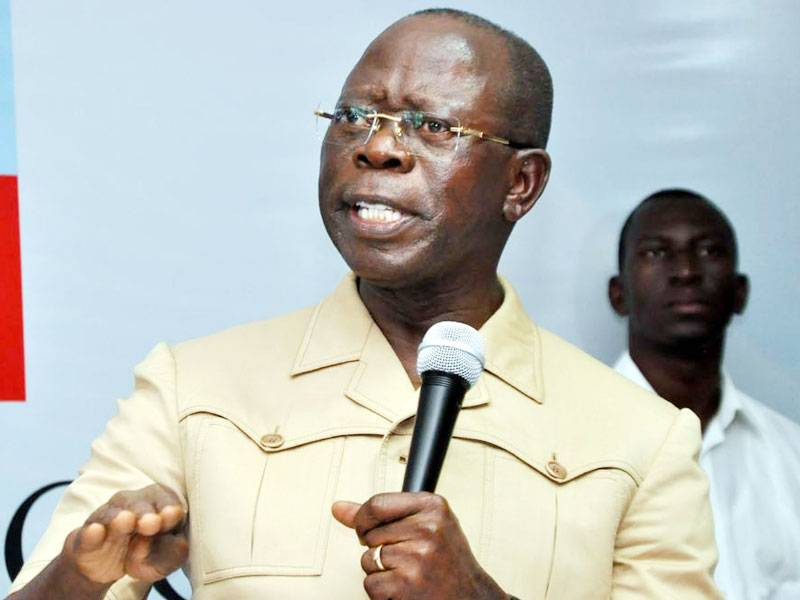From activism and social crusader’s posture, the Fourth Republic has produced quite a number of political actors who have tasted the allure of power, riding on the crest of activism to gain political prominence. Daily Trust chronicles some of the activists who have become political figures in Nigeria’s democratic dispensation.
Adams Oshiomhole
The former governor of Edo State and current senator, Adams Oshiomhole, is arguably the first name that comes to mind when talking about politicians that rode on the wings of activism to political prominence. His role as the fire-spitting, no-nonsense labour leader carved a name for him and made him a constant threat to President Olusegun Obasanjo’s second term. Oshiomhole led strikes and demonstrations against the increase in the price of petroleum and faced arrests, tear gas, and temporary blockades of union offices during the face-off with the Obasanjo administration.
Seen as the crusader for better welfare for the working class and better living conditions for Nigerians, Oshiomhole endeared himself to Nigerians, which played a significant role when he decided to test the waters of partisan politics.
Oshiomhole joined the then Action Congress (AC), which transformed into the Action Congress of Nigeria (ACN), where he ran for the 2007 Edo governorship election. Though the INEC declared Prof. Oserheimen Osunbor of the Peoples Democratic Party (PDP) as the winner of the election, Oshiomhole and his party contested the victory, and he was later declared the winner of the election and got re-elected.
Oshiomhole, as an entrant into the politics of Edo State, bragged about defeating godfathers in the state, but critics said he himself had sought to replicate himself as a godfather to his successor. As the National Chairman of the All Progressives Congress (APC), Oshiomhole fought with his successor, Godwin Obaseki, with the crisis leading to the denial of Obaseki the opportunity to fly the flag of the party for the 2020 governorship election.
Obaseki would later move to the PDP and defeat the Oshiomhole-led APC to secure his second term. This, among others, pundits noted contributed to Oshiomhole’s eventual ouster as the APC national chairman. He, however, remains in the ruling party and is currently a senator representing Edo North.
Kayode Fayemi
Dr. Kayode Fayemi, former Governor of Ekiti State, was not only an intellectual in politics, but a pro-democracy activist. Coming from a private sector background, Fayemi is one of the most prominent politicians the Fourth Republic has thrown up.
The former Ekiti governor and one-time chairman of Nigeria’s Governors’ Forum was also at the forefront of fighting the military junta through the management of several opposition radio stations.
He became the governor of Ekiti for eight years. He was also Minister of Solid Minerals Development in the first term of former President Muhammadu Buhari.
Shehu Sani
Senator Shehu Sani is one of the public servants that the present democracy has gotten from civil society and the human rights community. Born on October 29, 1967, Sani was a senator representing Kaduna Central Senatorial District between 2015 and 2019. He was one of the vocal lawmakers in the upper legislative chamber during the 8th Assembly.
As an activist right from his days at Kaduna Polytechnic, where he was a Student Union leader, he was jailed several times by successive military juntas during the struggle for the restoration of democracy in Nigeria. For his alleged role in the 1995 phantom coup, he was sentenced to life imprisonment before it was commuted to 15 years in jail. His role in the Campaign for Democracy (CD) made him a constant threat to the powers that be, which led to his being accused of promoting an illegal association and subsequently charged with treason.
After his sojourn in the Senate was cut short in 2019 due largely to his fall out with the then governor of his state, Sani has remained in the national limelight with his hard takes on national issues.
Dino Melaye
Senator Dino Melaye started his political journey as a leader of the National Association of Nigerian Students (NANS) and, at some point, the Secretary General of the African Youth Council and the Commonwealth Youth Council.
He rode on the comradeship pedestal to become an active player in the country’s political scene, having been appointed first by former President Olusegun Obasanjo to be the Chairman of the Presidential Advisory Council on Youths.
He was elected to the House of Representatives to represent Kabba/Ijumu Federal Constituency in 2007. After his stint in the House of Representatives, he started the Anti-Corruption Network, accusing the former President Goodluck Jonathan’s administration of treating corruption with kid gloves.
In 2015, he was elected into the Senate to represent Kogi West, succeeding Senator Smart Adeyemi, who would eventually defeat him four years later.
Arguably one of the most controversial federal legislators Nigerians have had since 1999, Melaye, who ran for the Kogi governorship election in 2023 under the PDP, has created a different brand of personality for himself.
- Competition sparks hope for Nigeria’s reading culture
- Indonesia seeks more collaboration with Nigeria in energy sector
Philip Shaibu
Comrade Philip Shaibu, who until recently was Deputy Governor of Edo State, has been an activist since his days at the University of Jos, where he bagged a degree in accounting. He was Welfare Secretary of the Student Union Government at the university. He would later become the President of NANS in 2000, at a time when Nigeria was just returning to a democratic government after years of military junta. As a student’s leader, Shaibu joined others in fighting for the increase in allowance for members of the National Youth Service Corps (NYSC) from N3,500 to N7,500 by the Obasanjo administration. He also participated vigorously in the Abacha Must Go protest prior to the return to democracy in 1999.
He was in the public sector until 2002, when he retired from the Prisons Service to venture into politics and contested elections for the Edo House of Assembly to represent Etsako West and lost. After leaving the ANPP for the ACN, he was elected to the House of Assembly in 2007. He was re-elected in 2011 and was elected as a member of the House of Representatives in 2015. He later became Deputy Governor when Godwin Obaseki was elected governor of the state in 2016. He recently fell out with the governor, ostensibly due to his ambition to succeed him. The relationship between the duo went completely sour, and he was eventually impeached.
Rotimi Amaechi
Rotimi Chibuike Amaechi was Governor of Rivers State for eight years, Speaker of the House of Assembly of Rivers State, Chairman of the Governors’ Forum, and Minister of Transportation. He was one of the prominent student activists in his day at the university. He was President of the National Union of Rivers State Students (NURSS), and riding on his activism, he has been actively involved in the politics of Rivers State since he gained national prominence.
Festus Keyamo
Festus Keyamo (SAN), the current Minister of Aviation and Aerospace Development, has graduated from being a human rights activist to a political figure, holding important positions in the APC-led government.
As a mentee of the late Gani Fawehinmi, the fiery lawyer and activist fondly regarded as the Senior Advocates of the Masses (SAM), Keyamo was one of the prominent human rights activists in Nigeria before venturing into politics. He had received numerous awards for his efforts in the promotion of human rights and campaigning for accountable governments. He had served as a legal representative in several high-profile cases.
But Keyamo emerged as one of the most controversial figures in the APC, especially during the campaign leading to the election of President Bola Tinubu following his appointment as a spokesperson for the campaign.
Bamidele Opeyemi
Michael Opeyemi Bamidele, fondly referred to as MOB, is the current Leader of the Senate. He started activism in his days at the University of Benin as an executive of the Students Union Government. He was the Public Relations Officer of SUG and the Chairman of the Students’ Union at OAU and UNIBEN, respectively. He was at some point the leader of NANS before venturing into politics in Lagos. He served as Special Assistant to the former Governor of Lagos, Bola Tinubu, and later Commissioner in the Ministry of Youth, Sports, and Social Development.
Alex Otti
The governor of Abia State, Alex Otti, also started activism right from his days at the University of Port Harcourt. Though he later went into the private sector, working in various banks, where he rose to the position of managing director in one of the deposit money banks, he was deeply involved in students’ activism after his initiation into the progressive students’ movement known as Youths Solidarity on Southern Africa and Nigeria (YUSSAN). He has been nursing the governorship ambition of Abia since 2015 under the All Progressive Grand Alliance (APGA) before luck smiled on him and he actualised his ambition of governing his state, becoming the only governor produced on the platform of the Labour Party (LP) in the 2023 general elections.
Conceptualising the similar sojourn of these activists, a public affairs analyst, Achike Jude, himself an activist, told Daily Trust that quite a number of activists in governance took advantage of their activism to gain power while they abandoned the struggle after getting to political offices, saying there are genuine activists and some are “cashvists.”

 Join Daily Trust WhatsApp Community For Quick Access To News and Happenings Around You.
Join Daily Trust WhatsApp Community For Quick Access To News and Happenings Around You.